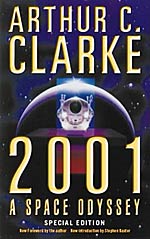
![]() ParallelWorlds
ParallelWorlds
9/19/2013
![]()
New American Library, 1968
Intended Audience: Adult
Sexual content: None
Ace/Genderqueer characters: Yes (A.I.)
Rating: PG
Writing style: 4/5
Likable characters: 3/5
Plot/Concepts: 3/5
Since their first inkling of intelligent thought, through the millennia until their first manned mission to Jupiter, humanity didn't realize something was watching them. David Bowman in particularly didn't realize that he was not alone in the universe, nor could he ever imagine joining these other beings among the stars.
It's difficult to summarize 2001: A Space Odyssey, since its plot and timeline—while mostly linear—takes enormous leaps forward and backward through time. This results in perspective shifts, too, some of them quite drastic. My least favorite part of the book was the beginning, situated at the dawn of the human race when man-apes encounter an obelisk of unknown origin which teaches them the rudimentary skills needed to hunt. Suffice it to say that I did not agree with the assumptions that part of the plot was built on, in regards to the ingredients for human success as well as animal intelligence. Many of them are grossly outdated when current knowledge of human history and animal behavior is taken into account, but since this book was written decades ago, that might be excused.
The main part of the book takes place from the perspective of David Bowman, who is in command of a ship bound for Jupiter. Bowman and his colleague Poole are the only humans awake on the ship, though they have other crew members in stasis, watched over patiently by the supercomputer HAL 9000. Inevitably, something goes wrong (where would the plot be otherwise?), and the lives of the entire crew are put in jeopardy. Maybe it's a bit silly to skirt around "spoilers" for a book that was written in the sixties. Everybody knows it's Hal's fault that Dave ends up alone on the ship, right? Well, in the book, Hal's malfunction is examined and explained a bit better, which enables greater sympathy for his character, although his "screen-time" is still pretty short. Dave is a pretty regular guy, and there is nothing particularly memorable about any of the other human characters, which might make it difficult for some people to connect. But on the other hand, such characters can be useful in stories where the main point is the vicarious experience rather than the character experiencing it.
What impressed me most was the accuracy with which Clark predicted certain technologies such as the internet. While it was a bit overly optimistic to think we could have advanced artificial intelligence and spacecraft capable of manned flights to Saturn by the year 2001, this book was written before the first moon landing, and yet most of the various gadgets and lingo don't seem dated even half a century later. This is the main reason I gave the book an average mark in plot/concepts despite its strange structure and trippy incomprehensible ending. Too often in old science fiction the ideas of what our modern society will be like seem a bit silly now, but Clark somehow managed to avoid most of that. Granted, this book does suffer from the annoyingly persistent sexism which plagued most science fiction (and media in general) back in the day. I can name exactly zero female characters, and even if there were some I'm sure they wouldn't be on any equal footing with the men. The language also reflects this old-fashioned sensibility—humanity is "man" and "his" potential is spoken of in these pages, not that of humankind as a whole.
So to break it down into pros and cons, my favorite points of the book were Hal's psychology, David's interactions with Hal, and the awe-inducing descriptions of various planets, stars, and other celestial bodies. The writing style itself was very pleasant to read, even if the direction of the narrative was difficult to follow at times—sometimes diverting into a flashback or flash-forward without warning. As I said, I disliked the generally outdated ideas in the beginning; I also found it a little difficult to take the last bit of the story very seriously due to the fact that most of what Dave experiences sounds like one very weird hallucination. Still, taken in context, even the ending can be appreciated as a reflection of the wild imaginings spurred by the age in which the impossible was about to become real. In that era, men walking on the moon no doubt seemed as ridiculous to some as Dave's experiences in the end are to me.
Suffice it to say I understand why this book is a classic—its themes were immediate when it was first released, bringing the realities, dangers and novelties of technology to the curious reader in intricate detail (right down to how toilets work in space). And now, it gives us something to look back at even as we reach forward—it is more technologically relevant than most science fiction I've read or watched, written not only to amaze with the fantastic but rather with the realistic as well. Even if the ending does make me laugh…I'm excited to read the sequel, 2010: Odyssey Two!
http://www.parallelworldsmagazine.com/book-review-2001-a-space-odyssey-by-arthur-c-clarke/